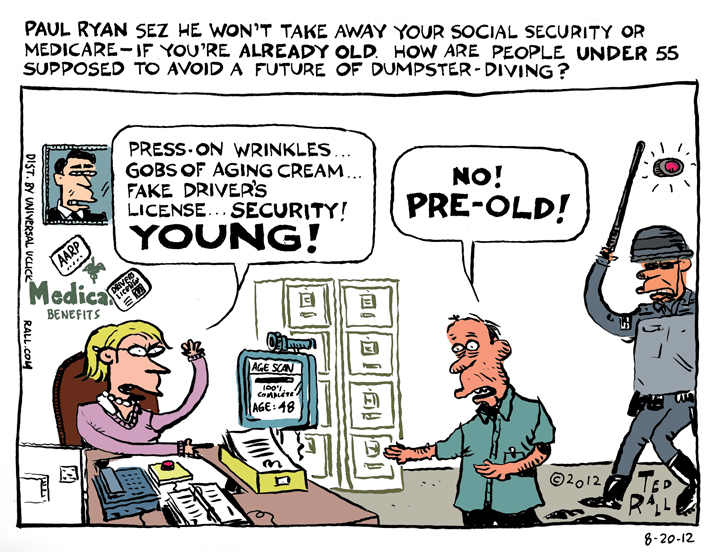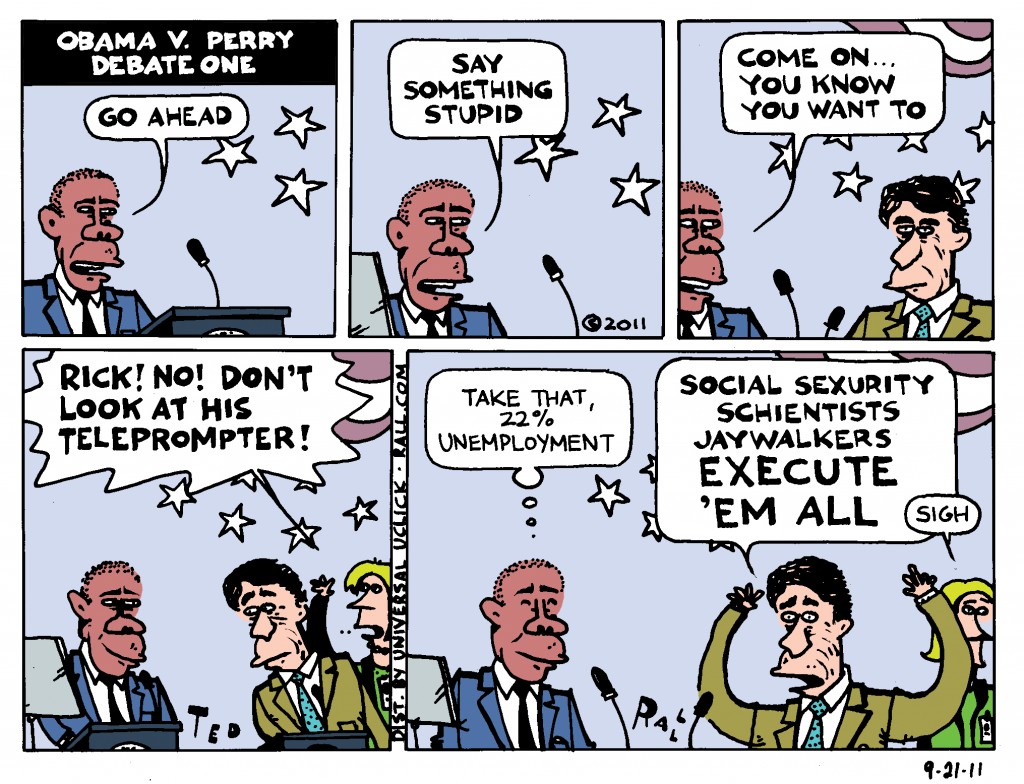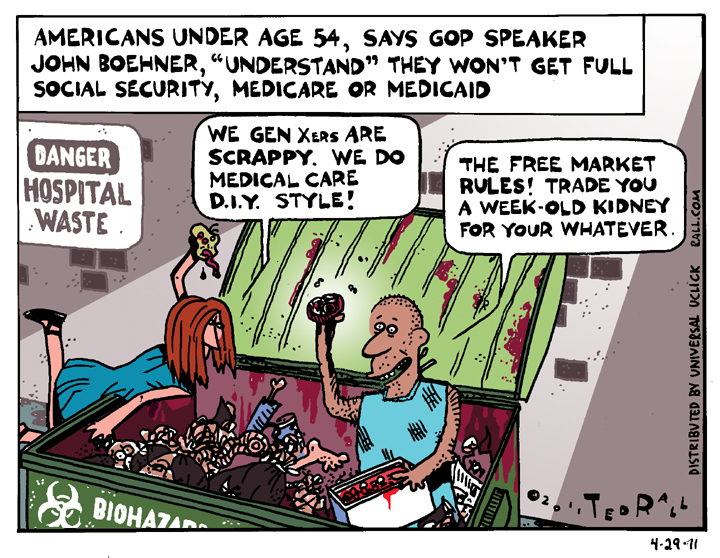Paul Ryan says he won’t reduce Social Security or Medicare benefits if the Republicans win–at least not for people who are currently elderly. What about people under 55 years old–the pre-old? How are they supposed to avoid a future of dumpster-diving?
SYNDICATED COLUMN: The GOP Bets on Bad Judgement
Voters Focus on Spending at Just the Wrong Time
Ross Douthat, the conservative columnist who elevates bland to middle-brow art for The New York Times, thinks Republicans have overreached in their showdown with Obama over the debt ceiling. “[The Republicans’] inability to make even symbolic concessions has turned a winning hand into losing one,” he says.
Advantage, according to Douthat, representing the mainstream media: Obama.
Of course, Obama had already agreed to begin dismantling Social Security and Medicare, surrenders Republicans have craved for decades. If he pulls off this “victory” Obama will have done more damage to the Democratic Party and its core values than any president in our lifetimes. How will he promote what Douthat fears will be a “victory”? I wonder.
Or, to lift a line from “Double Indemnity”: I wonder if I wonder.
Back a few pages, Times reporter Jesse MacKinley finds himself in the curious position of writing that no one really cares about a story that has dominated the headlines for weeks.
“Indeed, the drama of whether the government will raise the debt ceiling (to the chagrin of some conservatives demanding tighter financial belts) or allow it to remain as is (to the horror of the administration and economists who predict financial ruin) seemed largely lost on a populace involved in more pressing—and more pleasant—summer distractions,” asserts MacKinley.
To summarize:
No one cares about the debt ceiling.
And:
Among the few political geeks who understand what’s going on, much less have an opinion, the tide is allegedly turning in favor of Obama because he’s willing to compromise and the Tea Party-led GOP isn’t.
Conventional wisdom floggers like Douthat say that if Congress can’t strike a deal and economic consequences follow—a reduction in the ratings of U.S. government-issued securities and a panic in the securities market—voters will hold Republicans accountable in 2012. Even if things don’t turn that far south, the GOP will pay for their intransigence. Obama wins in a cakewalk.
I’m not so sure.
In the same way that generals usually refight the last war, mainstream political pundits often apply old scenarios to new situations. This is not 1995, when then-House Speaker Newt Gingrich orchestrated a shutdown of the federal government that set the stage for Bill Clinton’s reelection the following year.
Without a doubt, the Republicans’ willingness to imperil the pure platinum credit of Treasury notes and bonds is reckless and irresponsible. There is also no denying their naked hypocrisy and intellectual dishonesty. These so-called “deficit hawks” voted 19 times to raise the debt ceiling by $4 trillion.
If Republicans were serious about balancing the federal budget they’d start by slashing the military, which accounts for 54 percent of discretionary spending—and which hasn’t done anything to defend the U.S. from a real enemy since 1945. The Department of Homeland Security, a vast new bureaucracy created by Bush after 9/11 in order to make us take off our shoes, should be eliminated.
Moreover, the middle of the biggest economic meltdown since the industrial revolution is no time to be cutting debt. Read your Keynes: governments are supposed to spend their way out of downturns, and pay down debt during upswings.
Republicans, it seems, are trying to finish off an economy that is already gravely wounded.
Politically, however, I think they’re onto something. Year after year of warnings about the expanding national debt—remember Ross Perot’s charts?—the American people are finally, genuinely alarmed about the pace and scale of government spending. The current national debt of $14 trillion isn’t the magic number that flips some sort of switch in the public.
It’s simply that, at certain times, public opinion on an issue that has been around for years, divisive and apparently intractable, suddenly coalesces into widespread consensus. Climate change. Gay marriage. The war in Afghanistan, which was so popular in 2008 that Obama won by promising to expand it, but is now seen as stale and unwinnable.
Win or lose on the debt ceiling showdown, GOP strategists are betting than voters will reward them for taking an uncompromising stand on spending against a president who has increased the national debt faster than any of his predecessors. It’s not 100 percent—but I’d say it’s a pretty safe bet.
This is the worst possible time for the American people to start worrying about out-of-control federal spending. But it’s good for the GOP.
(Ted Rall is the author of “The Anti-American Manifesto.” His website is tedrall.com.)
COPYRIGHT 2011 TED RALL
SYNDICATED COLUMN: Guilty After Proven Innocent
Make DSK Whole—Then Jail Him
“Innocent until proven guilty.” We say it. We teach it to our children. But we don’t believe it.
Dominique Strauss-Kahn, charged with ambushing a hotel cleaning person at a hotel in midtown Manhattan and forcing her to perform oral sex on him, has been released.
This was not the usual case of a well-heeled defendant wielding money and influence to weasel out of responsibility for his crime. To the contrary, the NYPD and district attorney believed the alleged victim, initially characterized as a hard-working immigrant struggling to support her family. The cops aggressively pursued DSK, as the French media calls him. They even subjected him to the “perp walk” that signifies official contempt.
But that’s all over. District attorney Cyrus Vance, Jr. says the case has fallen apart. The victim was unreliable at best, a conwoman at worst. The charges are dead. DSK is free.
Innocent until proven guilty, right?
Technically.
But not really.
When you’re accused, the story screams in blood-red 112-point type above the fold on page one for weeks on end. When you’re exonerated, it runs one column-inch buried in the classifieds—on the day all your friends, relatives and colleagues happen to miss the paper.
Strauss-Kahn won’t go to prison. Not for whatever happened or didn’t happen at the Sofitel. (He will face a rape charge filed by a French reporter, who accuses him of going after her “like a chimpanzee in rut” years ago.)
Though legally innocent, DSK will not be restored to his job leading the International Monetary Fund, which he was forced to resign as he cooled his heels at Rikers Island. No reason given. Just: no.
Before getting dragged out of his first-class seat on an Air France jet bound for Paris, the deaccused rapist was widely considered a frontrunner for the Socialist Party’s nomination for the French presidency. Now George W. Bush has a better chance than DSK of moving into Elysée Palace. Too much dirt has come out. Legally innocent he may be, but too many voters harbor doubts.
Like the old Soviet Union, the United States and its Western puppet states (France included) mindlessly repeat too many sweet-sounding slogans devoid of real meaning: “Equal justice under the law.” “All men are created equal.” “One man, one vote.”
“Innocent until proven guilty.”
If legal innocence (i.e. the failure of the state to convict one of a crime) is to rise above the status of hollow rhetoric, people like DSK ought to be entitled to the full restoration of their pre-arrest status. In DSK’s case, he is morally entitled to his old job at the IMF and an open invitation by the French Socialists to run for his nation’s highest office. He also deserves to be compensated for the legal bills and bail costs he accrued during his ordeal.
Not many people reading this will agree with me. Which is my point: as a society, we don’t really believe in “innocent until proven guilty.”
We did not revel in Dominique Strauss-Kahn’s arrest because of the crime that the legal system has since decided not to pursue, rape. We laughed and jeered because we hate(d) him.
We hate(d) DSK because he is rich and evil.
Had DSK been a run-of-the-mill accused rapist, few would have noticed and no one would have been as gleeful about his predicament. Here was the fearsome chief of the mighty IMF, an old, smug, white pig forced to shower with an electronic monitoring device locked to his ankle. “Le Perv!” shouted the New York Post.
How delicious!
After the arrest I published a cartoon showing DSK in a police interrogation room. I pride myself on my refusal to leap aboard media bandwagons, so I didn’t assume he was guilty. “What’s the big deal?” I showed him asking police detectives. “I’ve been raping the world for years!”
It takes a cruel genius to turn big profits on the backs of the world’s poorest people. Meet DSK’s IMF.
First IMF officials such as DSK convince the political leaders of say, Kyrgyzstan, that they could rapidly modernize their Fourth World backwater with a loan. Build some new highways! How about that long-awaited hydroelectric dam? Foreign corporations will rush in to do business! Paying us back will be a breeze!
This is, to be charitable, as overly optimistic as Countrywide telling slum dwellers they’ll never regret an adjustable-rate mortgage. There are good reasons that foreign firms do not invest in dumps like Kyrgyzstan. Those reasons do not change because there’s a new airport road or a new four-star hotel.
Increase in GDP or no, the IMF loans come due. What to do? IMF experts parachute in. Their recommendation: “structural adjustment.” No more profligate spending on social programs. Close those pricy health clinics! The IMF is the world’s biggest loan shark.
Ripped social safety nets cause social unrest. Kyrgyzstan, once relatively stable, was propped up by IMF loans in the late 1990s. They came due, forcing the poor nation to curtail social spending. It has since been swept by a series of riots, coups, ethnic cleansing and even warlordism.
Here in the United States, IMF-style gangster capitalism takes the form of Republican/Tea Party “starve the beast” demagoguery. There’s always money for rich people. And for wars. And for wars that make rich people richer. For the poor and middle-class, Medicare and Social Security are ostentatious and unaffordable luxuries. Socialized medicine, guaranteed cost-of-living increases and unlimited unemployment benefits are off the table.
It is this economic outlook, devoid of humanity and contemptuous of people’s basic needs, that Dominique Strauss-Kahn represents.
We all hate him. We hate those like him. That perp walk looked so…right.
He deserves prison, no doubt about it. Until there’s a revolution, however, DSK will never suffer for the crimes he committed as a globe-trotting financier.
Even as DSK flew first-class and left his most intimate DNA in $450-a-night suites at four-star hotels, his IMF was demanding that the citizens of Greece and Portugal slash pensions and hike college tuition. That is his biggest crime, undeniable and unforgivable, and the one for which he and those like him should someday face justice.
(Ted Rall is the author of “The Anti-American Manifesto.” His website is tedrall.com.)
COPYRIGHT 2011 TED RALL
SYNDICATED COLUMN: Yes, I Can
Straight Talk on Balancing the Budget
The federal budget deficit is like the weather. Everybody talks about it; except for Bill Clinton, no one ever does anything about it.
President Obama’s bipartisan Fiscal Debt Commission has released a draft report that starts out with a big problem: even talking about reducing spending is insane when you’re in the midst of a Depression. The real unemployment is over 20 percent. Creating jobs ought to be the feds’ top—perhaps sole—priority.
Let the insanity commence.
Triumphant Republicans say they want to balance the budget. So does Obama. Are they serious? Of course not.
Still, theoretical budget-balancing exercises help enlighten us about where our taxdollars really go. So let’s roll up our sleeves and start some back-of-the-envelope slashing.
The 2010 federal budget shows $3.6 trillion in spending and $2.4 trillion in revenues. Net deficit: $1.2 trillion. It’s a doozy, too. It nearly 13 percent of GDP. It’s the highest since 1943, during World War II.
The goal, then, is to close a $1.2 trillion budget gap. Can we find at least $1.2 trillion in budget cuts? News flash: getting rid of the National Endowment for the Arts ($161 million in 2010, or about 0.01 percent of the deficit), ain’t gonna do the trick.
Any serious budget cutter has to start with defense. The reason is simple: it accounts for 54 percent of discretionary (i.e., optional) federal spending. It’s the biggest piece of the pie by far.
(Mainstream news reports usually state that defense accounts for 20 percent of federal outlays. But they’re fudging the facts in order to pretty up the military-industrial complex. For example, they include budget items like Social Security that no one can do anything about—they’re in a trust fund.)
Of that 54 percent, 18 percent is debt service on old wars. There’s nothing we can do about that—though that number should probably give us pause the next time a president wants to invade Panama or Grenada.
Anyway, that leaves 36 percent, or $1.3 trillion to play with. $200 billion a year goes to Afghanistan and Iraq.
Let’s pull out. We’re losing anyway.
New Deficit: $1.0 trillion.
In 2007 Chalmers Johnson wrote a book about the staggering costs of American imperialism. “The worldwide total of U.S. military personnel in 2005, including those based domestically, was 1,840,062 supported by an additional 473,306 Defense Department civil service employees and 203,328 local hires,” he wrote. “Its overseas bases, according to the Pentagon, contained 32,327 barracks, hangars, hospitals, and other buildings, which it owns, and 16,527 more that it leased. The size of these holdings was recorded in the inventory as covering 687,347 acres overseas and 29,819,492 acres worldwide, making the Pentagon easily one of the world’s largest landlords.”
We’re broke. It’s time to bring those 2.3 million men and women home. At an average cost of $140,000 per employee—crazy but true—we could save $322 billion annually.
New Deficit: $676 billion.
After Defense, the other big costs are Social Security, Medicare and Medicaid.
The obvious place to start slashing is wealthy recipients. Why should Bill Gates, worth $58 billion, get Social Security or Medicare benefits? Dean Baker sums up the traditional liberal argument in favor of giving tax money to people who don’t need it: “Social Security enjoys enormous bipartisan support because all workers pay into it and expect to benefit from it in retirement. Taking away the benefits that better-off workers earned would undoubtedly undermine their support for the program. This could set up a situation in which the program could be more easily attacked in the future.”
Yeah, well, whatever. We. Are. Broke. “Means testing”—for example, eliminating benefits for the approximately one percent of families over age 65 who earn over $100,000 a year—could save $150 billion a year.
New deficit: $526 billion.
Now let’s talk about the other side of the equation: income. How can the U.S. government scare up some extra cash?
Allowing the Bush tax cuts for the richest three percent of Americans to expire on schedule would bring in $70 billion a year. Seems like a no-brainer: anyone earning over $250,000 a year is doing awesome. Moreover, if Democrats don’t insist on the expiration of at least some of those “temporary” tax cuts, what’s the point of the deal they cut with the GOP back in 2001?
New deficit: $456 billion.
When it comes to revenues, you have to go where the money is: the wealthy. The rich have gotten richer, which is a big part of the reason we’re in a Depression again. They’re hogging all the goodies. The rest of us can’t spend.
Despite the miserable economy, there are still 2 million American households earning a whopping $250,000 or more per year. (Their average income is $435,000.) If we were to increase these super-rich Americans’ marginal income tax rate from 35 to 50 percent—the same it was during the early 1980s under Reagan—we’d bring in an extra $131 billion a year. If we raised it back to 91 percent—the top rate during the boom years between 1950 to 1963—the Treasury would collect $487 billion.
Budget SURPLUS: $31 billion.
And we haven’t started on corporate taxes.
(Ted Rall is the author of “The Anti-American Manifesto.” His website is tedrall.com.)
COPYRIGHT 2010 TED RALL



